BCU acts do not define human rights and obligations – Constitutional Court ruling
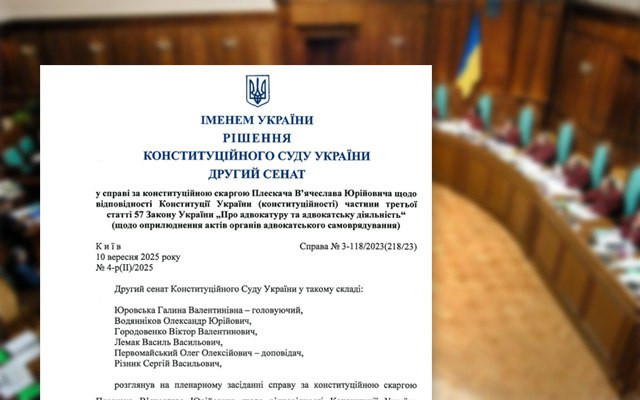
Decisions and other acts of bar self-government bodies regulate the professional activities of advocates and do not define their rights and obligations within the meaning of parts two and three of Article 57 of the Constitution of Ukraine and other provisions thereof.
This conclusion was made by the Constitutional Court in a case concerning the publication of acts of bar self-government bodies. As previously reported, the Second Senate of the Constitutional Court adopted decision No. 4-r(II)/2025 in the case of a constitutional complaint by Vyacheslav Pleskach regarding the constitutionality of part three of Article 57 of the Law «On advocacy and the practice of law».
According to this provision, decisions of bar self-government bodies come into force on the day they are adopted, unless another term is provided for in the decisions.
The complaint alleged that this provision contradicts Article 57 of the Constitution (regulatory legal acts defining the rights and obligations of citizens must be brought to the attention of the public in the manner prescribed by law, otherwise they are invalid), as it allows decisions of the BCU to take effect immediately upon their adoption. This violates the constitutional right of everyone to know their rights and obligations. The contested provision stipulates that rights, freedoms, and obligations are restricted by the normative acts of BCU without bringing them to the attention of the advocate in a manner that would ensure his or her awareness of the date, time, publication, authentic text, and fact of adoption of such a normative act.
The Constitutional Court confirmed that acquiring the status of an advocate does not deprive a person of their constitutional rights and freedoms. Relations between advocates and bar self-government bodies should arise and develop in the spirit of corporate unity and mutual respect. Therefore, bar self-government bodies must ensure the transparency of their activities, in particular the openness and accessibility of their decisions, which are binding on all advocates.
At the same time, the acts of bar self-government bodies are applicable only to a specific and professionally defined group of persons – advocates who have voluntarily chosen the profession of an advocate and the status of an advocate and, as a result, must comply with self-governing mechanisms for regulating the practice of advocate.
Such acts regulate the professional activities of advocates and do not define their rights and obligations within the meaning of parts two and three of Article 57 of the Constitution of Ukraine and other provisions thereof.
The Constitutional Court's decision also states that the date of entry into force of decisions of bar self-government bodies, which are normative acts, cannot precede the date of their adoption and publication. If necessary, a transitional period (vacatio legis) should be introduced for these acts to take effect, allowing advocates to adapt their activities to the new regulatory framework.
Given that a constitutionally consistent interpretation can be made with regard to Part 3 of Article 57 of the Law, and that there are no convincing and sufficient arguments for recognizing it as violating constitutional provisions, the Constitutional Court ultimately concluded that part three of Article 57 of the Law «On advocacy and the practice of law» complies with the Constitution of Ukraine.
Decision No. 4-r(II)/2025 of 10 September 2025 in the case concerning the publication of acts of bar self-government bodies can be viewed at this link.
Popular news
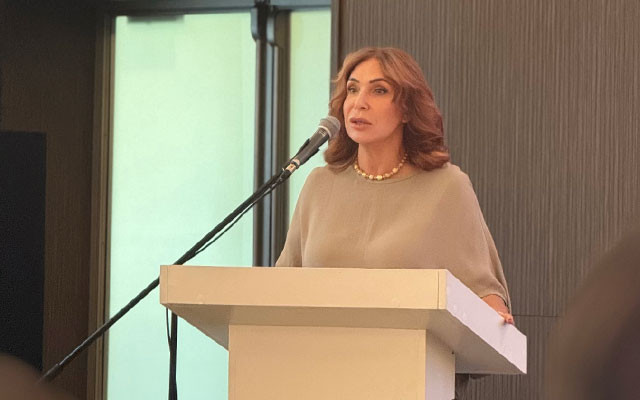
Discussion
Without the protection of advocates, there will be no fair trials in Ukraine — forum in Odesa
Identifying an advocate with their client undermines the foundations of justice, as it deprives individuals of the opportunity to exercise their right to defense, forces advocates to avoid participating in high-profile cases, and ultimately renders procedural guarantees meaningless. Without this, fair trial is impossible.
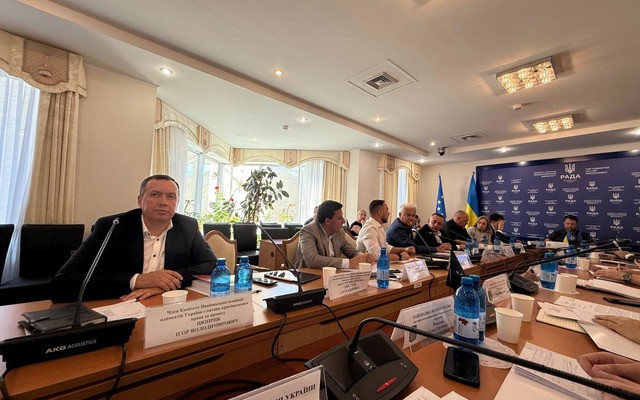
Legislation
What data is sufficient to initiate an investigation – UNBA comments on draft law No. 12439
The problem of law enforcement pressure on business remains one of the most acute for the Ukrainian economy. The lack of regulation of certain procedures in the Criminal Procedure Code leads to abuses, as a result of which entrepreneurs find themselves in a state of legal uncertainty.
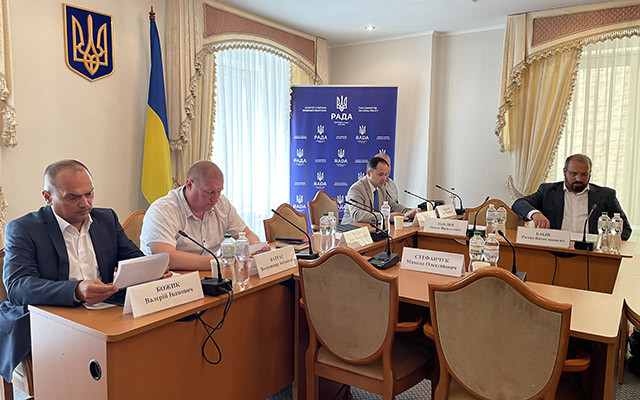
Guarantees of the practice of law
The Verkhovna Rada is waiting for the Minister of Justice to take action on signing the Convention on the protection of t…
Ukraine, which was directly involved in the preparation of the world's first Council of Europe Convention on the protection of the profession of advocate, has still not signed it. There appear to be no formal objections, but no real steps have been taken towards accession either.
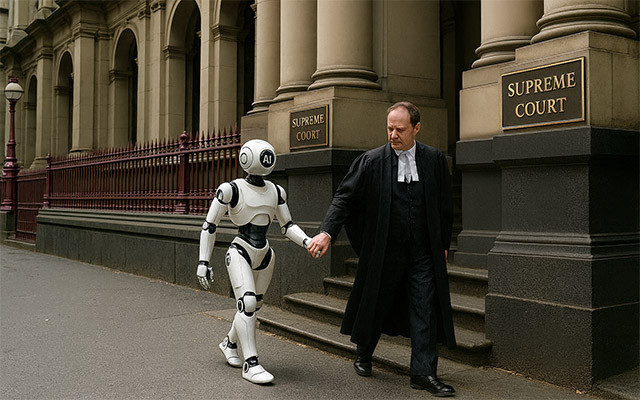
Abroad
Australian advocate apologizes in court for fake AI quotes
In Australia, a royal advocate apologized to a judge for submitting documents in a criminal case against a teenager accused of murder that contained fabricated quotes and non-existent court decisions generated by artificial intelligence.

Legislation
Support for the defense industry should not upset local budgets, - UNBA
It is necessary to create additional incentives for enterprises in the defense and industrial complex, while ensuring the balance of the budget system and the predictability of both revenues and expenditures of local self-government.

Legislation
UNBA warns of extreme financial risks for defense industry companies
The lack of transparent control over the activities of the Ministry of Defense as a regulator, as well as excessive sanctions for leaving the Defense City regime, create risks for defense enterprises that could lead to their bankruptcy.
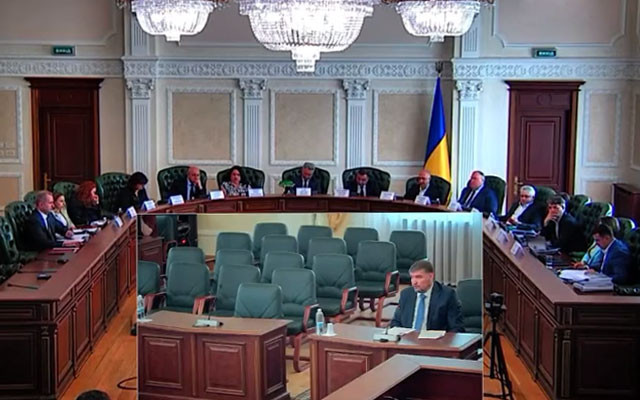
Guarantees of the practice of law
BCU reports interference by a member of the High Council of Justice in the activities of a lawyer and submits officia…
The Bar Council of Ukraine, having considered the statement of advocate Oleksandr Vikhrov, established the fact of interference by Roman Maselko, a member of the High Council of Justice, in the advocacy activities, violation of attorney-client privilege, and exceeding his powers in evaluating a candidate for the position of judge.
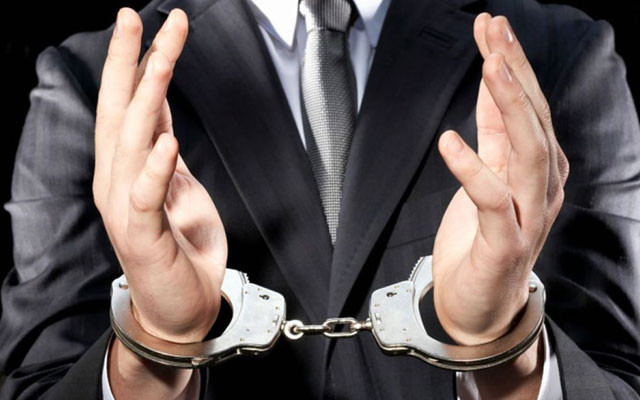
Legislation
Consent to arrest advocates must be given by bar self-regulatory bodies
Granting the High Council of Justice the power to give consent to the detention of an advocate or to keep him in custody would be a direct interference in the activities of the Ukrainian advocacy. This contradicts the principle of independence of the advocacy guaranteed by the Constitution and laws.
Publications

Censor.net Protecting advocates – protecting justice: addressing concerns about the new law

Ihor Kolesnykov A BRIEF SUMMARY REGARDING THE APPLICATION OF THE ORDER ON EXTENDED CONFISCATION IN LATVIA REGARDING FINANCIAL ASSETS OF…

Valentyn Gvozdiy WORKING IN A WAR ZONE

Lydia Izovitova Formula of perfection

Sergiy Vylkov Our judicial system is so built that courts do not trust advocates

Iryna Vasylyk Advocacy in the proclamation of Independence of Ukraine

Oleksandr DULSKY When we cross the border of the Supreme Anti-Corruption Court, we get into another department of the National Anti-Corruption…

Vadym Krasnyk The UNBA will work, and all obstacles and restrictions are only temporary inconveniences
